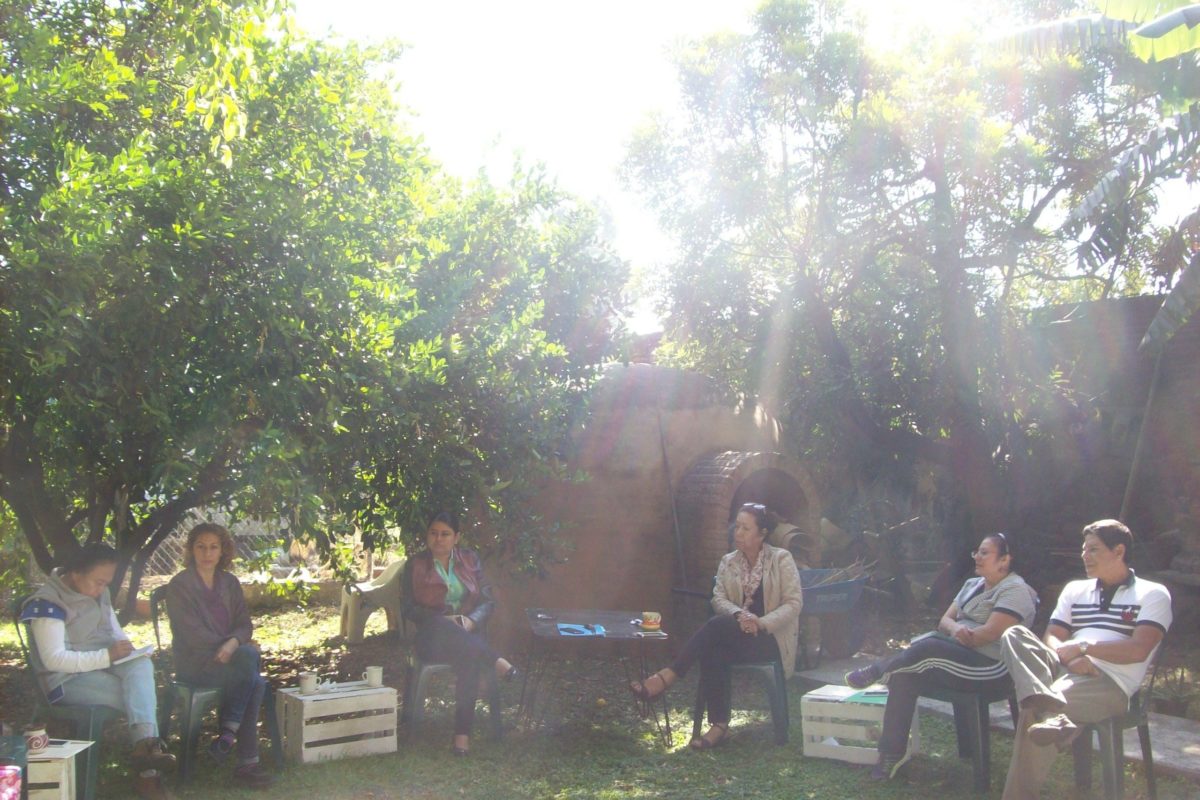
An ESPERA community lending pool has been operating in Morelos, Mexico, since 2010. One of the successful businesses spawned by this lending pool is Tetemazcal, named after the steam bath ritual (temazcal) of the indigenous people of that region.
Teresa Urióstegui Porcayio is the leader of this small business, which includes her two children (ages 18 and 21), her husband and her sister. “Even though my husband and I had work,” she explains, “an extra income was necessary to meet all the expenses of our household and to pay for school for our children.” In fact, she points out, the majority of people in Mexico suffer from a constant economic crisis which is why, even a family like hers with two incomes, could not provide for necessities.
Before joining the ESPERA lending group, she and her husband had tried to start several businesses: a coffee shop, an Internet cafe, a gift shop. But all failed due to lack of sufficient funds to both pay the rent and invest in building the businesses.
Teresa’s current steam bath business operates out of her home, which means there is no rent to pay. This was a big selling point to Teresa and her husband. Plus, the two-year $1,000 loan she received from the ESPERA community lending pool covered the construction of the steam house and a cistern to ensure a supply of water.
Their home had a large garden space where the steam bath could be constructed. But what really inspired them, Teresa recalls, was the realization that this business could “rescue a tradition that we inherited from our ancestors that focused on the physical, mental and spiritual well-being of our people.”
The word temazcal in Nahuatl means house of steam. The temazcal is a closed structure of varying dimensions. Porous stones of volcanic origin are brought into the structure, having been previously heated until red hot. These stones, known as “grandmothers,” generate steam when they are sprinkled with rosemary, eucalyptus or other herbal water. The steam is managed and directed by a guide (a tomazcalero) with leafy bouquets of fresh plants.
In pre-Hispanic Mexico, this steam bath ritual was something available only to great lords, priests and other privileged people such as warriors and women about to birth. Now people of all walks of life can benefit from this ritual through temazcals like the one operated by Teresa and her family. As Teresa says, “We have affordable prices tailored to the means of each person. And, on many occasions,” she emphasizes, “we offer these services for free!”
Teresa explains that several people usually enter the tetamazcal together and stay in the steam house for 15 minutes to an hour or more. The temazcal is a place for purification and rebirth; it is a point of connection between human beings and the transcendent—but also with the others. Songs and prayers may be part of the ritual which builds bonds of harmony and mutual support.
Before leaving the steam house, each participant rinses his or her head with cold water and the body with hot water and then is enveloped in a blanket to return to the outside world.
This steam bath ritual was common throughout Mesoamerican cultures (Aztecs, Zapotecs, Mixtecs and Mayans). The steam house represented the womb of Mother Earth and the place where a person’s spirit could be reborn free of all its dark parts by moving through four doors, representing the four stages (physical, emotional, mental and spiritual) of healing. There are a variety of places in the Mexican state of Morelos where this ancient practice continues today thanks to the oral tradition of indigenous communities.
According to Teresa, these are some of the benefits that the steam bath can provide: toning of the skin, alleviation of the discomfort of pre-menstruation, help with weight loss, elimination of toxins, reduction of stress and anxiety as well as facilitation of introspection and reflection.
In addition to the ancient steam bath ritual, these steam houses, including Teresa’s, are also used today for massages, aromatherapy and various meditation exercises. The fact that her sister Elsa had just completed a course in therapeutic massage contributed to the decision to embark on this business venture.
While Tetemazcal has had its setbacks, it continues to grow each year, Teresa says. She, as well as the other 11 businesses participating in this community lending pool, benefit from courses offered by the local Espera network on how to manage and promote small businesses. Now, Teresa says, Tetemazcal is focusing on creative ways to promote this business by using social media.
Learn more about the ESPERA community lending program.
